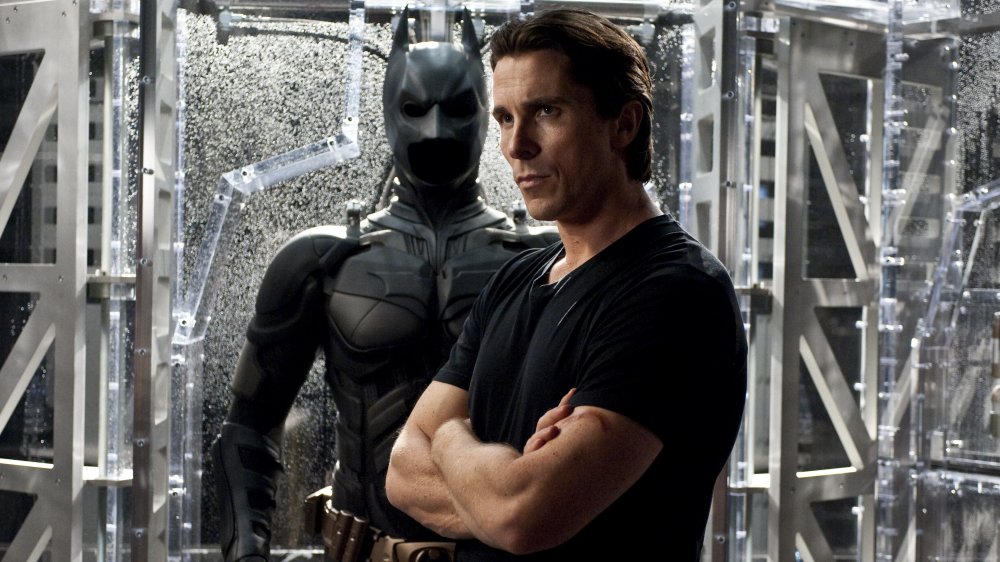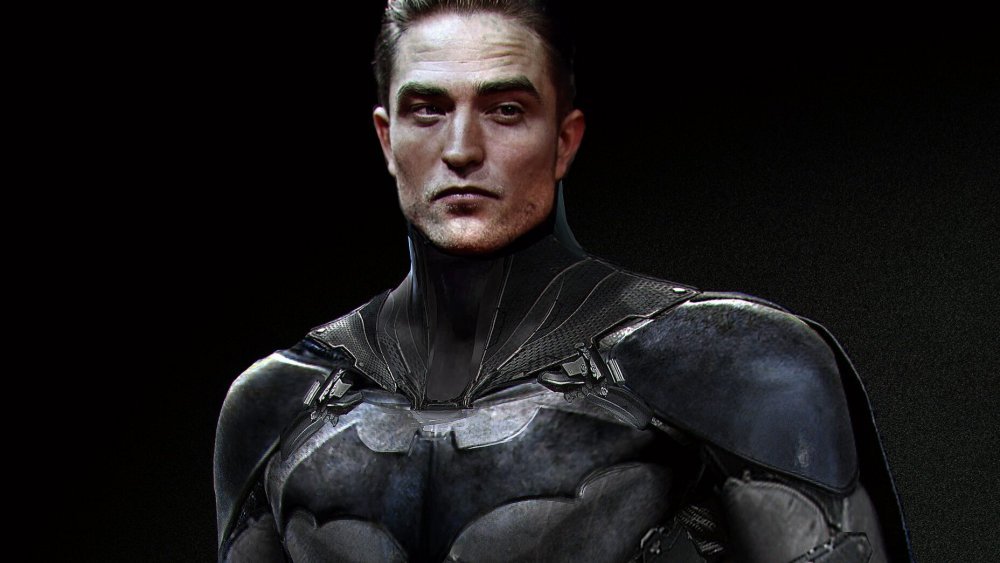The Real Reason We Never Got A Dark Knight 4 From Christopher Nolan
Holy refreshing sense of humility, Batman! It sounds like Christian Bale really did know when to say goodbye to his role as the Dark Knight.
Bale has been hot on the publicity trail of late in support of his new race car drama Ford v Ferrari, in which he plays a racer opposite Matt Damon's mild-mannered car designer. Recently, the Ford v Ferrari press campaign found the former Batman actor sitting down with the folks at The Toronto Sun, who used part of their time with him to ask a question that's long been on the minds of fans devoted to Bale's iconic work in Christopher Nolan's Dark Knight trilogy.
The question, of course, was this: "Why didn't Bale sign on for a Dark Knight 4?"
Bale's answer to the question is as simple as it is surprisingly humble. The actor claimed he ultimately decided a fourth turn as the Caped Crusader (and thus a Dark Knight 4) would have been "overindulgent."
That's right — in a time where stars and studios seem to keep lining up blockbuster sequels to milk every single penny out of a franchise, Bale, long regarded as a true "actor's actor," apparently told Warner Bros. "thanks but no thanks" when the studio approached him about reprising his role as Bruce Wayne for another Dark Knight venture. And if Bale is to be believed, he did so largely because he didn't want to overstay his welcome in the role.
It's worth nothing that Bale's decision was also greatly influenced by the fact that Nolan was indeed moving on from the Dark Knight franchise. As Bale continued to wax poetic about why he didn't return for a fourth Dark Knight flick, he admitted as much — noting that, outside of his own wishes to leave Batman behind, his decision to walk away from what would've no doubt been a mammoth payday for Dark Knight 4 was equally out of respect for Christopher Nolan himself.
"We were never arrogant to assume that we had an opportunity beyond one film at a time. That's something that Chris always would talk about. He'd say, 'This is it. We're making one film. That's all we've got,'" said Bale. "Then when they came and said, 'You want to go make another?' It was fantastic, but we still said, 'This is it. We will not get another opportunity."
Bale went on to offer that while a trilogy was far from a given for Nolan's Dark Knight saga, it was, if only indirectly, what the director had in mind from the start.
"Chris had always said to me that if we were fortunate to be able to make three we would stop. 'Let's walk away after that,'" Bale shared. "Then when they [Warner Bros.] inevitably came to us and said, 'How about a No. 4?' I said, 'No. We have to stick to Chris' dream, which was always to, hopefully, do a trilogy. Let's not stretch too far and become overindulgent and go for a fourth.'"
As we all know, Bale and Nolan got two more chapters of their Gotham-set saga after the success of 2005's Batman Begins. With 2008's game-changing The Dark Knight and 2011's trilogy-capping The Dark Knight Rises, they also happened to fashion one of the most vaunted superhero trilogies in the history of cinema.
While The Dark Knight (the first of the series' sequels) is still widely regarded as being among the greatest superhero movies ever made, adoration isn't quite as strong for Nolan's The Dark Knight Rises, which continues to divide both critics and fans. Truth be told, part of the problem with The Dark Knight Rises is that the film itself feels a bit overstuffed, and teeters frequently on the edge of overindulgent in its own right. Perhaps Bale and Nolan were smart to end their franchise when they did.
Still, there's little doubt that fans of Nolan and Bale's Dark Knight trilogy would've turned out en masse for even a massively "overindulgent" Dark Knight 4, though such a film may have also tarnished the trilogy's mostly impeccable legacy.
Will The Batman capture the Dark Knight trilogy's magic?
While Nolan and Bale's trilogy forever changed the state of superhero cinema — particularly 2008's The Dark Knight, which was anchored by Heath Ledger's unforgettable turn as the Joker — Marvel Studios had already begun laying the groundwork for the vast franchise machine that is the Marvel Cinematic Universe with the release of Iron Man that same year. As Marvel's universe-building plans became clearer, it became equally obvious to DC and Warner Bros. that, despite them boasting one of the most successful superhero movie series in history with the Dark Knight trilogy, Marvel had struck on something far bigger and far more intriguing with their groundbreaking MCU.
DC and Warner Bros. unwisely tried to catch up to the extended universe approach to superhero cinema in one movie: 2016's Batman v Superman: Dawn of Justice, a film so jam-packed with stuff that the term "overindulgent" doesn't even come close to describing its overt shortcomings. Of course, it's also the film that kicked off the "Batfleck" era — with Ben Affleck stepping into the coveted role of Batman for Dawn of Justice, a surprise cameo in 2016's equally divisive Suicide Squad, and the massive misfire that was 2017's Justice League.
In the years since, the studio have admitted defeat in the great "extended cinematic universe" wars. As such, DC and Warner Bros. have also continued to find success in releasing standalone films featuring some of their bigger super-powered stars — i.e., Wonder Woman and Aquaman. They even delivered a surprise hit featuring an iconic villain with this year's Joaquin Phoenix-starring Joker – which has recently joined the billion-dollar movie club, has become one of the highest-grossing comic book films of all time, and looks primed to make a few waves come awards season.
DC and Warner Bros.' new approach to their own cinematic universe played a big part in rebooting their Batman and stepping away from Ben Affleck. They also moved on from pretty much anyone involved in Dawn of Justice or Justice League on the creative side. With a fresh, neo-noir take on the Dark Knight coming from Cloverfield and Dawn of the Planet of the Apes director Matt Reeves, it seems DC and Warner Bros. have sights set on recapturing some of the stylish mojo Batman garnered during Bale's run in Nolan's trilogy.
From the sounds of it, a big part of that approach for the next iteration of the Dark Knight is to get back to the basics of Batman. Case in point: Reeves' film is simply titled The Batman, and will apparently see the beloved comic book character get back to his detective roots as he seeks to spread his own version of justice across the streets of Gotham.
It seems Reeves and co. were eager to put another Brit behind the mask for the upcoming movie as well, scoring what could be a major casting coup by slotting Robert Pattinson into the dual lead roles of Bruce Wayne and Batman. While Reeves is still rounding out the cast for The Batman, he's already surrounding Pattinson with a legit murderer's row of venerated acting talent — with Paul Dano on board to play the Riddler, Zoë Kravitz set to appear as Catwoman, Jeffrey Wright portraying Commisioner Gordon, and Andy Serkis stepping into the role of Alfred Pennyworth.
With talent like that on board, it's safe to say that Batman is now in the best hands since Nolan and Bale brought their trilogy to a close. We'll just have to wait and see if The Batman can get DC's most iconic character back on track for future big-screen adventures. The Batman is currently slated to shoot in 2020, and will arrive in theaters on June 25, 2021.

